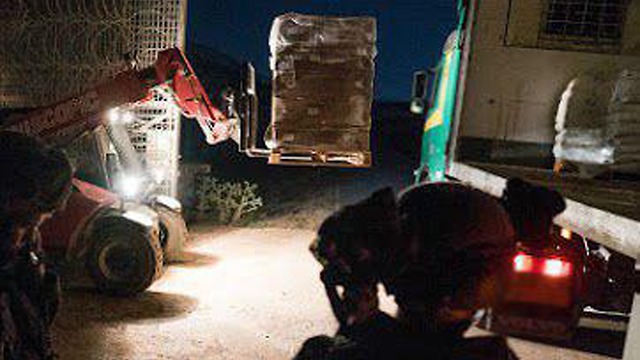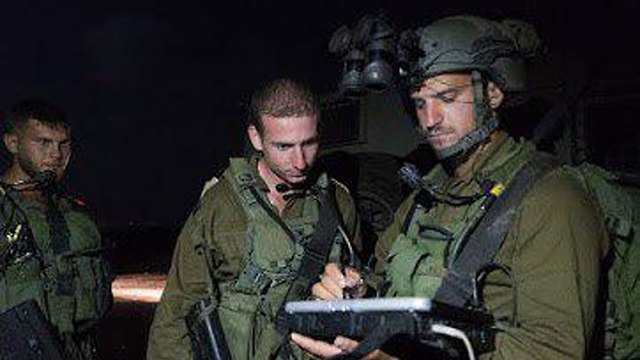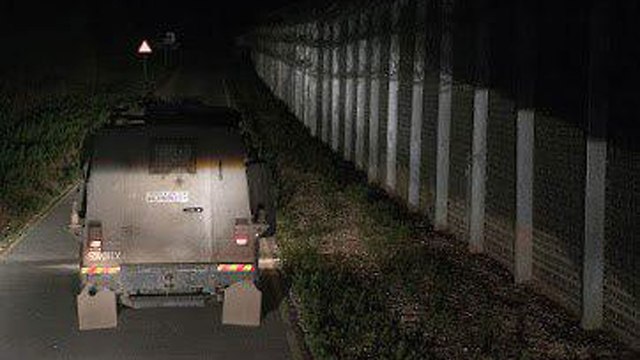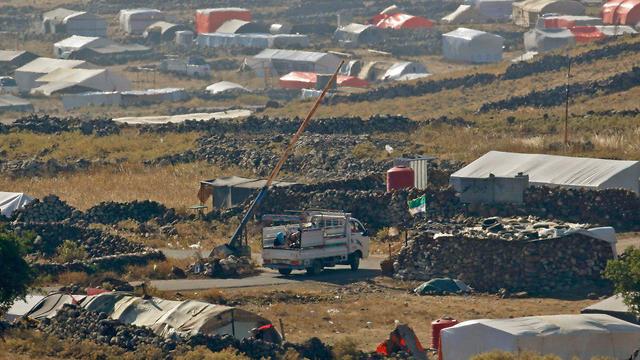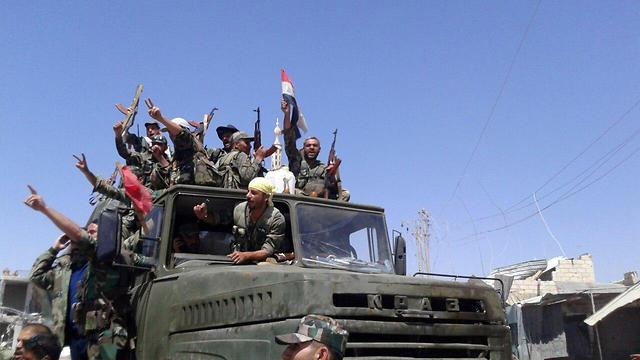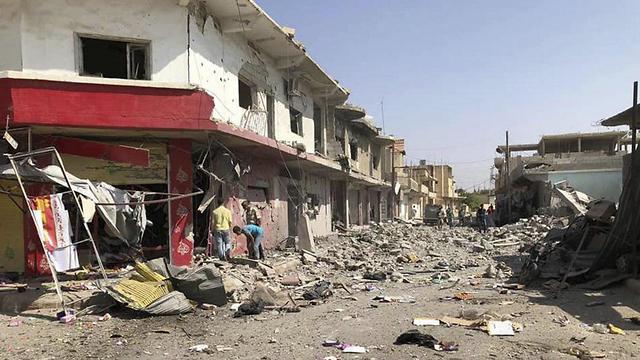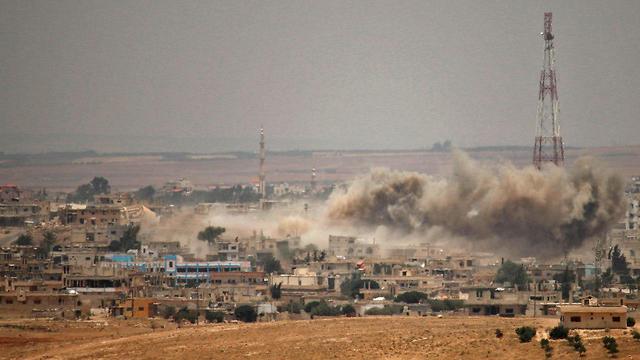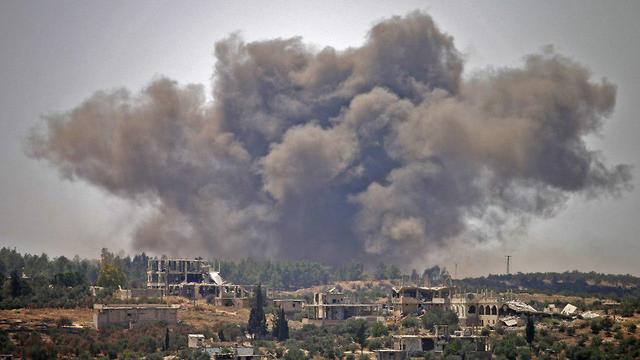

IDF sends humanitarian aid to Syria in overnight operation
Israel sends 300 tents, 13 tons of food, 15 tons of baby food, 3 pallets of medical equipment and medicine and 30 tons of clothes across the border as 120,000 Syrian flee from Deraa area, where Assad's army advances in battle against rebels; IDF stresses: We won't allow fleeing Syrians to enter Israel.
During the special overnight operation, some 300 tents, 13 tons of food, 15 tons of baby food, three pallets of medical equipment and medicine and some 30 tons of clothes and shoes were transferred into Syria from four different spots on the border.
The aid was transferred to Syrian refugee camps in the southern and central parts of the Syrian Golan. The camps, located near the border with Israel, house several thousands of Syrians under poor conditions with no access to water, electricity, food or other basic necessities.
While the IDF sent humanitarian aid, it made it clear it will not allow fleeing Syrians to enter Israel. "The IDF will continue maintaining Israel's security interests," the army said in a statement.
The IDF Spokesman's Office also said the army was monitoring the events in southwest Syria and was prepared for a variety of different scenarios, including sending further humanitarian aid.
For several years now, as part of its "Operation Good Neighbor," the IDF has been providing humanitarian, life-saving aid to Syrian civilians caught in the crossfire of the civil war raging in the country, while at the same time avoiding interfering in the conflict.
The Free Syrian Army reached a temporary ceasefire agreement with Russia in southern Syria, which started at midnight and ended at midday Friday.
The Syrian Observatory for Human Rights said more than 120,000 people have been forced to flee the area, with tens of thousands gathering at Syria's border with Jordan and thousands more fleeing to the frontier with Israel.
Observatory Director Rami Abdulrahman, speaking by phone, said civilians had now mostly left the eastern part of Deraa province, where government forces have been advancing. Some people had also crossed into government-held areas, he said.
The UN's Syrian envoy Jan Egeland said Thursday that humanitarian shipments to Deraa and the southern region of Quneitra have been disrupted since June 26.
"The extremely effective lifeline from Jordan across the border has been discontinued due to the fighting in recent days," Egeland told reporters.
Abu Jihad, a local opposition official near the border, said the violence since Wednesday had forced at least 11,000 people to flee their homes and towns. If the escalation continues, he said, people would head closer to the frontiers with Jordan and the Golan.
Jordan already hosts more than 650,000 registered Syrian refugees and has said it will not open its borders more, asking instead the United Nations to provide them with security within their home country. The UN, meanwhile, appealed to Jordan to keep the border open.
Ahead of his meeting with UN Secretary General António Guterres, Jordan's Foreign Minister Ayman Safadi said he "Will address urgency of international effort to achieve immediate ceasefire in south (Syria), provide protection to civilians inside their country and ensure needed assistance to them. Jordan remains engaged with all parties to achieve above as top priority."
Trying to split rebel territory
The Syrian army intensified its air strikes in southwest Syria on Thursday, killing dozens of people.
"We can't even catch up to count the air strikes," said Abdallah Mahameed, a rebel official in Deraa. "The house is shaking around us."
Syrian President Bashar Assad has sworn to take back every inch of Syria, and recapturing the southwest, one of the first hotbeds of the uprising against him, would leave rebels with only one remaining stronghold, in the northwest.
Assad's offensive in the southwest has been backed by air strikes and shelling that have killed 96 civilians since June 19, the Syrian Observatory for Human Rights war monitor said, including 49 on Wednesday and Thursday. Some 67 pro-government forces and 54 rebels have also been killed.
Insurgent territory in the southwest is strung along the borders with Jordan and Israel, narrowing to only a few kilometres wide at the city of Deraa.
The fighting so far had mostly focused on areas northeast of Deraa, where the army and allied militia recaptured a string of villages, but was extended to the city's outskirts on Tuesday.
The Hezbollah media unit said the army had captured the town of al-Harak, northeast of Deraa. The Observatory said it had advanced into the town's centre but fighting continued.
A rebel official said the army and allied militia were also seeking to cut insurgent ground in the southwest in two by storming an air base close to the Jordanian border.
"The goal for them is to split the western Deraa countryside from the city and the eastern Deraa countryside. Praise God, so far the fighters are standing strong and the regime was not able to advance," said Abu Shaima, a rebel spokesman.
'De-escalation zones are not for good'
The area is in a "de-escalation zone" agreed last year by the United States, Jordan and Assad's ally Russia to curb fighting. But despite American warnings that it would respond to an attack, it has not done so and Syrian opposition figures on Wednesday decried Washington's "silence."
Vassily Nebenzia, Russia's ambassador to the United Nations, indicated that Russia would no longer uphold the de-escalation zone, saying it was among the last strongholds of al Qaeda's Syrian branch and Islamic State, and the Syrian army has a "legitimate right" to fight "terrorists."
"Every de-escalation zone that we established was not established for good," Nebenzia told a news conference at the United Nations.
"I hope that all of the de-escalation zones will go into history and will have Syria territorially united under the control of the legitimate government. The de-escalation zone for those who are ready to uphold de-escalation still exists. But for those who resist any de-escalation, it doesn't."
The London-based Arabic-language Al-Hayat newspaper reported Friday that some European countries were not happy with the understandings taking shape between US President Donald Trump and Russian President Vladimir Putin on Syria, which include returning control to the southern part of the country to Assad and removing Iran from Syria entirely.
The Europeans claim Syria cannot be rehabilitated without a complete political overhaul and want to remove Assad.
Reuters contributed to this report.














